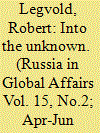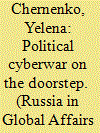| Srl | Item |
| 1 |
ID:
167954


|
|
|
|
|
| Summary/Abstract |
KENNETH A. WINK compares and contrasts a number of U.S. presidential election forecasting models and finds that some perform better than others. He argues that some systematic factors have an impact in every election regardless of the characteristics of the candidates, the effectiveness of the campaigns, and the events that occur in a particular election year
|
|
|
|
|
|
|
|
|
|
|
|
|
|
|
|
| 2 |
ID:
153478


|
|
|
|
|
| Summary/Abstract |
Russian and U.S. leaders, as they contemplate what next in the wake of the U.S. presidential election, are not only making their choices as the ground under them churns, the choices they make, whether they realize it or not, will bear directly on how dystopian the coming global order will be. The context for contemplating the possible direction U.S.-Russian relations may take is clouded not only by the tumult in the world outside, but by the political watershed the United States is now entering. Like the transformation recasting the international setting, the denouement of this passage will not come soon.
|
|
|
|
|
|
|
|
|
|
|
|
|
|
|
|
| 3 |
ID:
151548


|
|
|
|
|
| Summary/Abstract |
As the 2016 U.S. presidential election drew near, tensions over cybersecurity issues heated up. On November 5, just three days before U.S. voters went to the polls, NBC News quoted a senior anonymous intelligence official and some classified documents as saying that "U.S. military hackers have penetrated Russia's electric grid, telecommunications networks, and the Kremlins command systems, making them vulnerable to attack by secret American cyber weapons should the U.S. deem it necessary."
|
|
|
|
|
|
|
|
|
|
|
|
|
|
|
|
| 4 |
ID:
165860


|
|
|
|
|
| Summary/Abstract |
Did the election of Donald Trump affect the popularity of the European Union (EU) in Europe? Theoretically, both a positive rally effect (due to a perceived external threat) and a negative domino effect (due to resignation among Europhiles and/or reinforcement among europhobe nationalists) are plausible. We treat Trump’s unexpected victory as an external shock and use a Eurobarometer survey that was conducted in all EU-28 member states four days prior to (control group) and six days after the election (treatment group) as source material for a natural experiment. The analysis reveals that the election of Trump caused a significant increase in the EU’s popularity in Europe immediately after the election. This “Trump effect” is considerable in size, roughly equivalent to three years of education. Gains in popularity were particularly high among respondents who perceived their country as economically struggling and, surprisingly, among the political right, suggesting that Trump’s victory broadened and ideologically diversified the EU’s base of support.
|
|
|
|
|
|
|
|
|
|
|
|
|
|
|
|
| 5 |
ID:
153461


|
|
|
|
|
| Summary/Abstract |
UNTIL VERY RECENTLY, it had been a general mantra in the United States that it was wrong to put any restrictions on the Internet or bring it under any control. Silicon Valley innovators who designed social network platforms didn't worry too much about how the latter might be used. They planned to organize online communities where members would have facilities for comfortable intercommunication and trade. They had in mind conflict-free, purely progressive development of U.S. digital society and assumed that their designs were far ahead of the resources of terrorists.
|
|
|
|
|
|
|
|
|
|
|
|
|
|
|
|